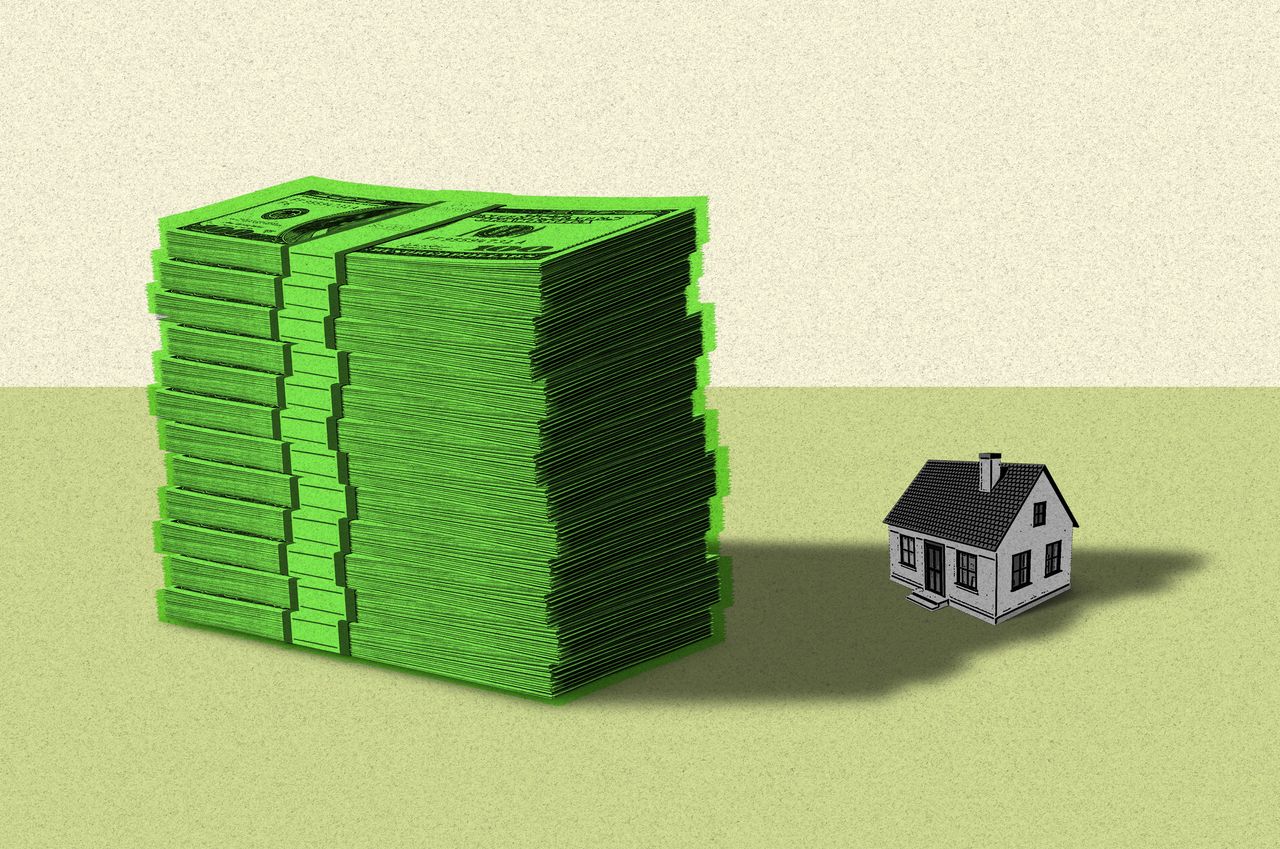The New Math on Inheriting Your Parents’ House
Rising costs are prompting more adult children to sell the homes they inherit from their parents
One of the first things many people do when they inherit their parents’ home these days is put up a for-sale sign.
Deciding what to do with a family property is often both an emotional and financial decision, but the rising costs of renovations, property taxes and utilities are making it harder for adult children to hold on to the real estate, financial advisers say. Higher home prices and mortgage rates have often also made it impractical for heirs to buy out their siblings, said Dick Stoner, a Realtor in Rockville, Md.
The high home prices of the past few years have made the decision to sell even more attractive. If inheritors can unload a house in a hot location for a high price, the proceeds from the home’s sale can help secure their finances and fund goals such as retirement, advisers say.
“For inheritors, cash is king,” said Paige Wilbur, Wells Fargo’s head of estate services.
Cash over sentimental value
Leaving a home to children remains a common way to transfer wealth, according to financial advisers and estate planners. There is no recent data that tracks home inheritance nationally.
More than three-quarters of parents plan to leave a home to their children when they die, according to a 2023 Charles Schwab survey of more than 700 American investors between the ages of 27 and 95. Some children may be reluctant to sell for sentimental reasons, but finances and simplicity of unloading a property often win out. Nearly 70% of those who expect to inherit a home from their parents plan to sell it, the survey found.
When Heidi Whaley and her sister, Melissa Mills, inherited their parents’ home, they chose to put it on the market. They recently listed the Charleston home for just below $3.5 million. The sisters, both retired, felt some sadness letting go of the home they grew up in and where their parents hosted many waterfront parties.
“My father wanted to build a house that would be strong, one which would be passed from generation to generation,” said Whaley.
Both sisters are empty-nesters with their own nearby homes, and said they couldn’t justify the expense of maintaining a nearly 4,000-square-foot house for the sake of fond memories.
Rising costs are a bigger part of the calculus these days when heirs decide whether or not to keep an inherited house, real-estate agents say. For instance, the higher cost to insure coastal homes in the Southeast is pushing more heirs in the area to sell, said Ruthie Ravenel, a Realtor in Charleston.
Inflation has also made repairs and upkeep on older properties more expensive, leading some to favour newer properties that may be cheaper to maintain and insure, she said.
I’ll keep the vacation home, though
The declining interest in keeping Mom and Dad’s home is part of a broader generational trend among inheritors, estate planners say.
Some tangible assets aren’t considered as valuable as they were in the past, thanks partly to changing tastes, said Wilbur with Wells Fargo’s estate services.
Renovation is expensive and what one generation sees as on-trend, the other may not. For example, the younger generation of beneficiaries mostly don’t want older traditional furniture. Instead, they prefer the modern, farm-style chic look, said Wilbur.
“While Mom and Dad’s home might be nice, the children may not want to live in it and would consider it too costly to renovate to their style,” she said.
Vacation homes and secondary properties, however, are more likely to be kept by heirs, at least for a few years, especially if it is in an appealing location, financial planners say. If multiple family members are inheriting a vacation house, there needs to be a way to split maintenance costs fairly and create a usage schedule that is to everyone’s liking, said Jeff Fishman, a financial adviser in Los Angeles.
Consider the taxes
Taxes remain a key reason many heirs sell relatively soon, financial advisers say.
Aaron Buchbinder, a real-estate agent in Boca Raton, Fla., is working with three brothers who inherited their grandmother’s condominium this year in Boca Raton and none of them live in Florida. They discussed keeping it and renting it out, but none of them wanted to keep it long term and preferred to sell because of the carrying cost of the homeowners association fees and taxes, said Buchbinder.
Heirs who wish to buy out their other siblings will want to use a reasonable method for valuing the home, said John Voltaggio, a managing director at Morgan Stanley Private Wealth Management. The family may decide to use the value reported on the estate tax return if it is recent, or they may want to obtain a few appraisals and use an average, he said.
The family members inheriting the property will also want to make sure they aren’t getting in over their head financially, with mortgage rates hovering around 7%.
“Many financial decisions today are very rate-dependent, so remove emotions or risk doing something you may later regret,” said Fishman, the financial adviser in Los Angeles.
A home’s cost basis—which is the starting point for measuring a future taxable gain—resets to market value, typically its value at the date of death, said Eric Smith, a spokesman for the Internal Revenue Service.
Any increase in value after death is taxed as long-term capital gains, and those rates are lower than the rates on short-term gain. But if a home is sold quickly, there is likely to be little gain if any and little to no tax, said Smith.
 Copyright 2020, Dow Jones & Company, Inc. All Rights Reserved Worldwide. LEARN MORE
Copyright 2020, Dow Jones & Company, Inc. All Rights Reserved Worldwide. LEARN MORE
A resurgence in high-end travel to Egypt is being driven by museum openings, private river journeys and renewed long-term investment along the Nile.
In the lead-up to the country’s biggest dog show, a third-generation handler prepares a gaggle of premier canines vying for the top prize.
The new Brooklyn Tower, a mix of luxury condos and rentals, rises from the historic Dime Savings Bank building.
Listing of the Day
Location: Downtown Brooklyn, New York
Price: $16.75 million
Boasting 360-degree panoramic views across New York City, this new 92nd-floor penthouse is the highest residence in Brooklyn.
The full-floor apartment stands atop the new Brooklyn Tower, which encompasses 143 condos and 398 rentals in the heart of downtown Brooklyn, said Katie Sachsenmaier, senior sales director, Corcoran Sunshine Marketing Group.
The condos begin on the 53rd floor, and the penthouses begin on the 88th floor. This one, Penthouse 92, is the only full-floor penthouse.
“The building is coming into its own now,” she said. “It feels very busy when you step into the lobby.”
Developed by Silverstein Properties, the building at 85 Fleet Street rises from the historic Dime Savings Bank building, according to a news release.
It was designed by SHoP Architects with interiors curated by Gachot Studios, and it is the borough’s only super tall skyscraper.
Penthouse 92 features custom interiors by Brooklyn-based Susan Clark of design firm Radnor, Sachsenmaier said. “Her selections have made it really beautiful. It feels very warm and inviting.”
Architectural details include 12-foot ceilings, European white oak floors in a custom honey stain, mahogany millwork, bronze detailing and floor-to-ceiling windows.
The eat-in kitchen features Absolute Black stone countertops, an island with seating, oil-rubbed bronze Waterworks fixtures and integrated Miele appliances, according to the listing.
The primary en suite bathroom showcases large-format Honed Breccia Capraia marble. There is also a separate laundry room as well as a wet bar and a butler’s pantry.
The views are spectacular, Sachsenmaier said. “If you’re standing in the living room, you take in the Statue of Liberty and all the way up through Midtown. On a clear day, you can see the planes take off at LaGuardia (Airport).”

Photo: Sean Hemmerle
Moving around the apartment, you see south over the harbor and then north and east over the whole city, she said.
From the front door, “you’re immediately greeted with the expansive living room and the view,” she said. “It’s really the first thing you see.”
The primary suite features a dressing room, multiple walk-in closets, two bathrooms (one with a cedar sauna) and southwest-facing windows, Sachsenmaier said. “You get those really beautiful harbour views.
The amenities will be ready by the end of summer, she said. A Life Time club will occupy the entire sixth and seventh floors, and an outdoor pool deck wraps around the dome of the bank building.
Stats
The 5,891-square-foot home has four bedrooms, five full bathrooms and one partial bathroom.
Amenities
Residents will have access to over 100,000 square feet of exclusive indoor and outdoor leisure spaces.
Fitness company Life Time will manage an array of amenities that include a 75-foot indoor lap pool, outdoor pools, a poolside lounge and atrium, a billiards room, a library lounge, a conference room, a theatre with a wet bar, a children’s playground and playroom and limited off-site parking.
The Sky Park offers an open-air loggia with a basketball court, foosball, a playground and a dog run.

Photo: Gabriel Saunders
Neighbourhood Notes
Downtown Brooklyn is at the centre of a number of neighbourhoods, including Fort Greene, Cobble Hill, Boerum Hill and Brooklyn Heights. The tower has access to 13 subway lines, 11 commuter trains, the city’s ferry network and 22 Citi Bike stations.
“You can walk to Fort Greene Park in less than 10 minutes,” and Dekalb Market Hall, which has a Trader Joe’s, a Target and a food hall, is “right next door,” Sachsenmaier said.
Agent: Katie Sachsenmaier, senior sales director, Corcoran Sunshine Marketing Group
The era of the gorgeous golden retriever is over. Today’s most coveted pooches have frightful faces bred to tug at our hearts.
Australia’s housing market defies forecasts as prices surge past pandemic-era benchmarks.
























